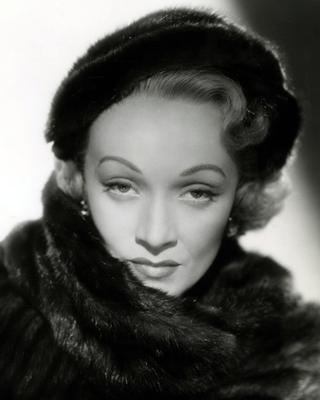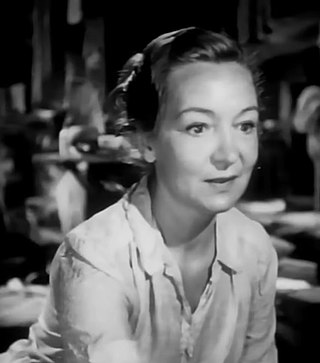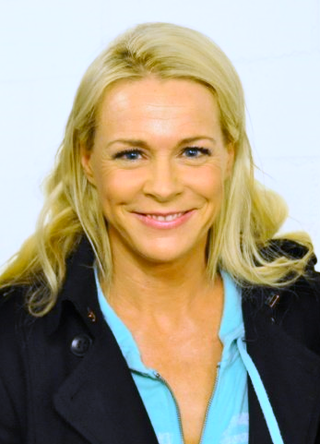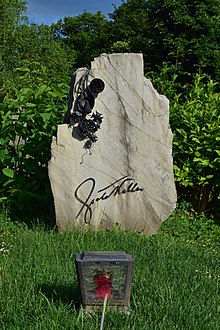
Marie Magdalene "Marlene" Dietrich was a German and American actress and singer whose career spanned from the 1910s to the 1980s.

"Lili Marleen" is a German love song that became popular during World War II throughout Europe and the Mediterranean among both Axis and Allied troops. Written in 1915 as a poem, the song was published in 1937 and was first recorded by Lale Andersen in 1939 as "Das Mädchen unter der Laterne". The song is perhaps best known as performed by Lale Andersen.

Zarah Leander was a Swedish singer and actress whose greatest success was in Germany between 1936 and 1943, when she was contracted to work for the state-owned Universum Film AG (UFA). Although no exact record sales numbers exist, she was probably among Europe's best-selling recording artists in the years prior to 1945. Her involvement with UFA caused her films and lyrics to be identified as Nazi propaganda. Though she had taken no public political position and was dubbed an "Enemy of Germany" by Joseph Goebbels, she remained a controversial figure for the rest of her life. As a singer Leander was known for her confident style and her dark, veiled voice.

Rodney Marvin McKuen was an American poet, singer-songwriter, and actor. He was one of the best-selling poets in the United States during the late 1960s. Throughout his career, McKuen produced a wide range of recordings, which included popular music, spoken word poetry, film soundtracks and classical music. He earned two Academy Award nominations for his music compositions. McKuen's translations and adaptations of the songs of Jacques Brel were instrumental in bringing the Belgian songwriter to prominence in the English-speaking world. His poetry deals with themes of love, the natural world and spirituality. McKuen's songs sold over 100 million recordings worldwide, and 60 million books of his poetry were sold as well.

The Blue Angel is a 1930 German musical comedy-drama film directed by Josef von Sternberg, and starring Marlene Dietrich, Emil Jannings and Kurt Gerron. Written by Carl Zuckmayer, Karl Vollmöller and Robert Liebmann – with uncredited contributions by Sternberg – it is based on Heinrich Mann's 1905 novel Professor Unrat and set in an unspecified northern German port city. The Blue Angel presents the tragic transformation of a respectable professor to a cabaret clown and his descent into madness. The film is the first feature-length German full-talkie and brought Dietrich international fame. In addition, it introduced her signature song, Friedrich Hollaender and Robert Liebmann's "Falling in Love Again ". It is considered to be a classic of German cinema.
David Bacon was an American stage and film actor.

Ute Gertrud Lemper is a German singer and actress. Her roles in musicals include playing Sally Bowles in the original Paris production of Cabaret, for which she won the 1987 Molière Award for Best Newcomer, and Velma Kelly in the revival of Chicago in both London and New York, which won her the 1998 Olivier Award for Best Actress in a Musical.

Florence Dawson, better known by her stage name Florence Desmond, was an English actress, comedian and impersonator.
"If You Go Away" is an adaptation of the 1959 Jacques Brel song "Ne me quitte pas" with English lyrics by Rod McKuen. Created as part of a larger project to translate Brel's work, "If You Go Away" is considered a pop standard and has been recorded by many artists, including Greta Keller, for whom some say McKuen wrote the lyrics.

Just a Gigolo is a 1978 West German drama film directed by David Hemmings and starring David Bowie. Set in post-World War I Berlin, it also features Sydne Rome, Kim Novak and Marlene Dietrich in her final film role.

Margarete Emma Dorothea "Grete" Mosheim was a German film, theatre, and television actress.

Sara Magdalena Ernman is a Swedish mezzo-soprano opera singer. Besides operas and operettas, she has also performed chansons, cabaret, jazz, and appeared in musicals. She is a member of the Royal Swedish Academy of Music. Ernman represented Sweden in the Eurovision Song Contest 2009 with the song "La Voix", finishing in 21st place.
Hermine Demoriane is a French singer, writer and former tightrope walker. Daughter of an engineer and a journalist, she married the British poet Hugo Williams in 1965, with whom she has a daughter, Murphy Williams, also a writer and journalist.

Marlene Dietrich was a German and American actress and singer.
Marguerite Hélène Barbe Elisabeth Constantine Lion, known as Margo Lion, was a Jewish singer and actress. She was born in Constantinople during Ottoman rule. She moved to Berlin after World War I with her father to join the school of Russian ballet. When the Nazi Party rose to power in 1933 she moved to France to flee antisemitic persecution. She was a successful chanteuse, parodist, cabaret singer, and actress, best known for her role as Pirate Jenny in director G. W. Pabst's 1931 French language adaptation of Bertolt Brecht and Kurt Weill's Threepenny Opera.

20th Century Blues is a live 1996 album by English singer Marianne Faithfull, in collaboration with pianist Paul Trueblood.
Portia Nelson was an American popular singer, songwriter, actress, and author. She was best known for her appearances in 1950s cabarets, where she sang soprano.

Eugénie Buffet (1866–1934) was a French singer who rose to fame in France just prior to World War I. She has been called one of the first, if not the first, performer of the chanson réaliste genre. She became a national sensation in France, performing in the fashionable cafés-concerts of Paris as well as embarking on both national and international tours. Her biggest success is said to be her performance of the song "La Sérénade du Pavé", written by Jean Varney in 1895. She was also known to perform in the street for charity in the poorer areas of Paris – work for which she was awarded the Légion d'honneur.
Peter Matz was an American musician, composer, arranger and conductor. His musical career in film, theater, television and studio recording spanned fifty years, and he worked with a number of prominent artists, including Marlene Dietrich, Noël Coward and Barbra Streisand. Matz won three Emmys and a Grammy Award and is best known for his work on Streisand's early albums as well as for his work as the orchestral conductor and musical director for The Carol Burnett Show.
Nina Franoszek is a German-American actress and film and theater director. Franoszek was awarded an Adolf Grimme Award for "Outstanding Lead Actress in a Drama Series" for her performance in the TV Mini-Series Sardsch (1998).














